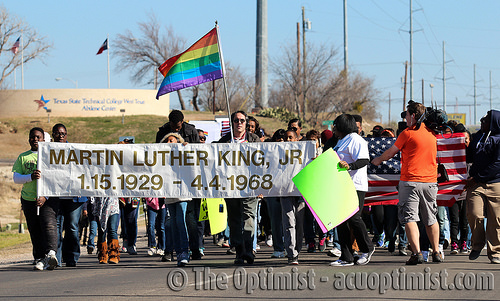Students and faculty joined hands with citizens of the community to take part in the Martin Luther King Jr. March Monday in downtown Abilene.
In 1963, King led more than 200,000 Americans across Washington Boulevard in Washington D.C. as part of a political rally for freedom and equality. The march ended with King’s famous I Have a Dream speech.
Bradie Roseberry, freshman elementary education major from Tyler, was one of the students who attended the walk. Clasping hands with fellow citizens, Roseberry said she learned the civil rights march was not only for colored Americans, but also people of all types of beliefs, nationalities and ethnicities.
“They were bringing their dogs and a bunch of little kids bringing their little scooters and stuff,” Roseberry said. “It was just really cool.”
With hands grasped, students and faculty march up the Martin Luther King Jr. Memorial Bridge between Cockerell Drive and Highway 80, remembering the great trials and tribulations King and his followers suffered through the civil rights movement.
Faculty members including Dr. Ron Morgan, professor and chair of the Department of History and Global Studies, attended the event. Morgan urged his students to attend the parade by granting them extra credit. However, Dr. Morgan said it shouldn’t be the extra credit that motivates his students to attend, it should be a remembrance of what happened and the effects of those actions.
“I wanted students to engage history in a real way in society,” Morgan said. “Connected to stuff that matters today.”
Morgan said the parade was a social platform during which Abilene citizens recited King’s former speeches and teachings that were spoken during one of the nation’s hardest periods.
“I learned that many of us have the same beliefs and how King wanted equal rights for everybody,” Roseberry said. “And just seeing how everyone came together despite their differences was a huge lesson for me.”
Roseberry said that she received an insight to the true meaning of the walk as a black woman’s hand reached through the crisp air and grasped her white hand.
Dr. Morgan says that Dr. King should not be solely viewed as a black activist, rather he should be known as an activist for the civil rights and freedoms of all people of color; from the lightest skin to the darkest.
“I think that Martin Luther King is seen as a black hero in America, that he is a symbol for African-Americans. And I think that’s the wrong kind of thinking,” Morgan said. “If for no other reason, others hadn’t done what they did, I would still be enslaved to racism. I would still have to live out and play the racist games because that’s the world I was being raised in.”
Morgan says it is very important to go out and experience the march to see the difference that King made.
“Mainly because what Martin Luther King did, and other people like him in American history, have done really heroic and sacrificial things and need to be recognized,” Morgan said.

